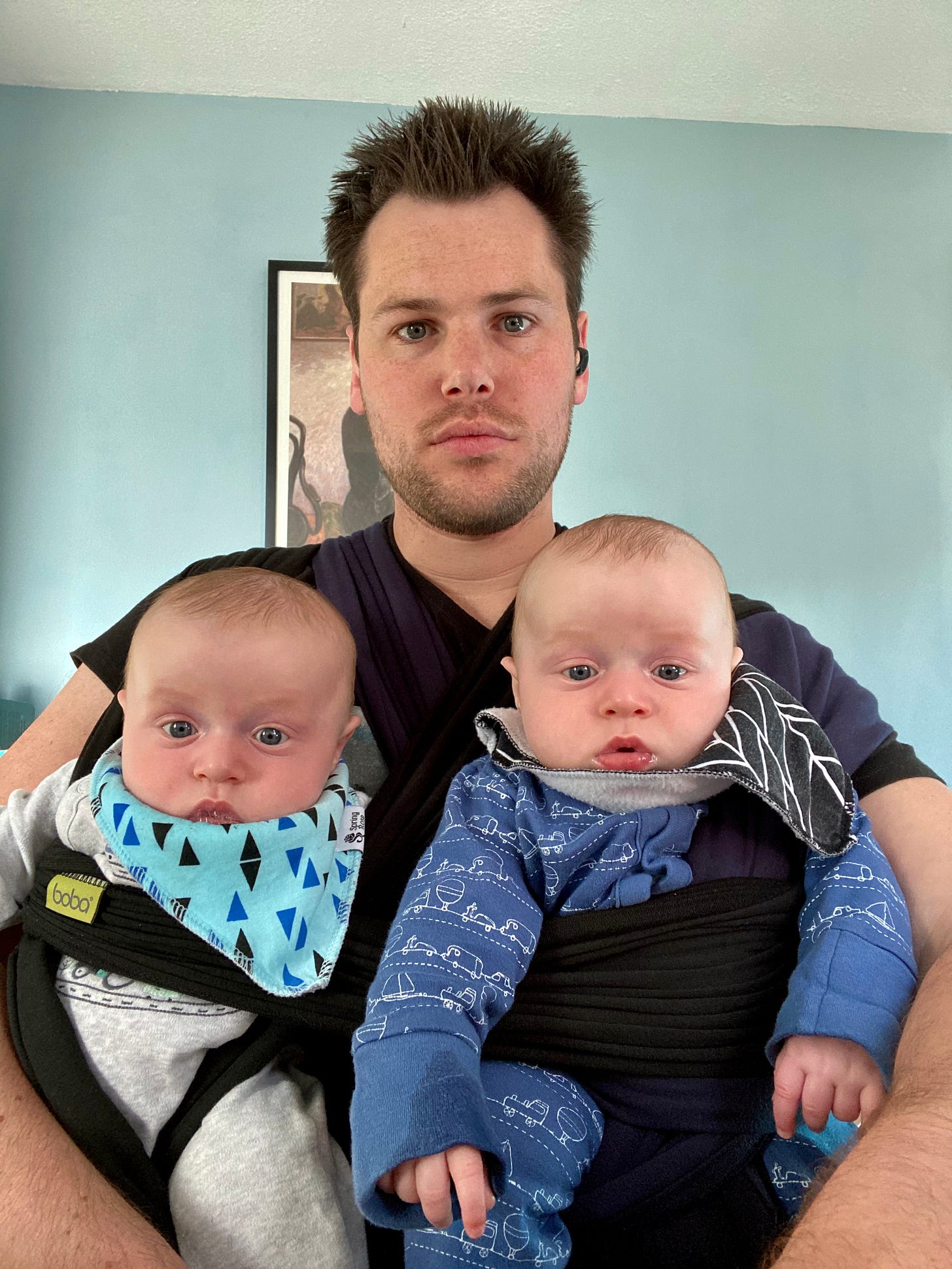…and was the best I ever had. Settle in for story time. I’m not sure what is worse, treating family members or treating colleagues. I’ve done my fair share of both as the treating therapist and have also had my fair share of injuries that I’ve consulted colleagues on. And yes, I’m as awkward a patient as I am a writer.
I have always done a variety of interesting things with my body from extreme sports to extreme quantities of normal sports that have left me vulnerable to injuries; extreme and otherwise. But it was a radical change in lifestyle, postural demand and general health that led to one of my most frustrating and treatment resistant issues ever: we had twins…during the pandemic. Amusingly for some, I developed bilateral De Quervains tenosynovitis, lasting for about 18 months between June 2020 and Christmas 2021 when my sons were between 6 and 18 months old. I give the dates to orientate you to their age and weight, as well as to point out that June 2020 was when we risked our life savings on an event called Therapy Live. I admit that the stress may have been relevant! The reason I say ‘amusingly for some’ is that De Quervains tenosynovitis is often known as ‘Mum Thumb’ due to its prevalence in mums of newborns. I wasn’t a mum, but at the time I was living with many of the risk factors; sudden increase in radial deviation from lifting and carrying, maintaining sometimes awkward end range wrist positions, poor sleep, weight gain, less exercise and wriggling loads that were growing daily!
‘It’ll settle when you’ve finished breastfeeding’ was a decent joke to be fair but made me realise how unfair this suggestion is on women who have enough pressure on them already when considering the pros and cons of their child’s nutrition. Annoyingly I didn’t have the hope of a significant change in endocrine physiology to wait for so I needed to consider alternatives. Loading, resting, taping, drugging, splinting and cursing didn’t seem to be turning things around so I booked a virtual appointment (they were ALL THE RAGE back then!) with a wrist specialist physio to see what I was missing.
My assessment was a good experience; he appropriately respected my own knowledge and insights but without cutting corners or assuming too much. I remember being excited to see what combination of existing elements or perhaps new elements he would suggest that I could integrate into my care to finally turn things around. But as my title gave away, that never came. He compassionately reassured me that with all that I had going on and with the current demands described, it was likely that I needed to ride it out until I could properly address the chaos in my life and simply gave me some strategies to make life more comfortable in the meantime. A better splint, better timing for my rehab, some self-mobs and resting positions that felt nice were all handy and therefore describing this as ‘doing nothing’ is of course nonsense, but we all know of patients and even some colleagues who would imply that this consultation was too uninvolved. Especially VIRTUALLY!
Low and behold, my wrist improved as my life improved. The kids walked more, helped when carried more, slept more (eventually) and I started to move my body more. He was right. He listened, he cared, he didn’t need to be the hero who came up with the magic answer, he was brilliant. He is called Thomas Mitchell and you should read and listen to his work on Physio Matters platforms and beyond.
Embarrassingly, I didn’t tell Thomas this until now. The life chaos I describe made me even less responsive to emails than usual and from what I can tell from a quick search, I thanked him a few months after the appointment and then never fed back properly. So to my final moral of this story; be the customer you want. I want my patients to tell me precisely how they’re feeling about our work together, regardless of how awkward their negative feedback might be or how cringeworthy their praise might be. Yet I don’t always hold myself to this standard and so have started to act more on this and encourage you to do the same. Radical honesty of a sort but whilst inviting the same back from the person whose service you’re a customer of.
Directness in the presence of challenging subject matter is what I love this month’s authors for and it’s interesting that their pieces have come together in this same issue. Alexandra Smiljanic is a chiropractor and business coach who is willing to challenge what it means to ‘have it all’ as a clinic owner. Jennifer James busts obesity myths like only she can in ‘Eat Less, Move More… if only!’. David Durand is a psychologist and keen advocate for MSK clinicians to lean into the psych toolbox without fear of professional encroachment. His piece challenges and reassures in equal measure. The mighty Phin Robinson has penned a long awaited piece on the costs of undervaluing physiotherapy. What an important cultural conversation for us right now and it’s great to share some of Phin’s wisdom in this month’s issue. Unfortunately that’s where the wisdom ends as I finally got around to writing the piece I’ve been threatening for a while… a reflection on my time on CSP Council. I reveal ‘How The Sausage is Made’ and much to my dismay, it turns out that the phrase ‘How The Sausage is Made’ isn’t as well known as I thought… so it might be littered with accidental innuendo.
Jack Chew
Editor In Chief
Do you want to write for MSKMag? Well you can by "Pitching A Piece" HERE








